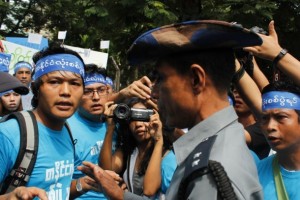22-28 October: Keep Human Rights on the Agenda for Burma
October 29, 2012 This week Tomás Ojea Quintana, the Special Rapporteur on the situation of human rights in Burma, presented his latest report to the United Nations General Assembly (UNGA) that will adopt, in a few weeks, its annual resolution on the situation of human rights in the country.
This week Tomás Ojea Quintana, the Special Rapporteur on the situation of human rights in Burma, presented his latest report to the United Nations General Assembly (UNGA) that will adopt, in a few weeks, its annual resolution on the situation of human rights in the country.
Since the lifting of sanctions and the renewal of diplomatic ties with the Burma government by many foreign countries, the UNGA resolution is one of the last tools remaining in the hands of the international community to encourage the government to turn the preliminary changes of the last year into more concrete democratic reforms.
Despite recent developments in Burma, the root causes of armed conflict still haven’t been addressed and human rights violations are ongoing, serious and prevalent throughout the country.
This week, the violence in Arakan State errupted again with more than a hundred victims in a week. Meanwhile, fighting in Kachin State continues and Mr. Quintana said in his press statement, “I have received allegations of attacks against civilian populations, extrajudicial killings, sexual violence, internal displacement, torture, forced labour and portering, as well as the ongoing use of landmines and the recruitment of child soldiers, by all parties to the conflict.”
To prevent further victims and violence we join Mr. Quintana’s call for the authorities to address the underlying causes of tensions in Arakan State. Likewise, as he expressed in his report, “any durable political solution must address the root causes of the conflict and the particular concerns of ethnic minority groups.”
Freedom of assembly and association continue to be no more than a semblance; this week again a lawyer was arrested for protesting without permission. Around 300 political prisoners still remain behind bars. Violations of housing, land and property rights are widespread, as Displacement Solutions shows in a new report. The Special Rapporteur captured well the serious concerns associated with the dramatic economic development the country is likely to experience over the coming years and recommends the government to “firmly embed a human rights-based approach to economic and social development in order to ensure that the principles of participation, non-discrimination, transparency, accountability and the rule of law guide this process.” Impunity is still enshrined in the Constitution and accountability for past and current serious human rights violations hasn’t been addressed. In addition, a high number of reforms still need to take place for the rule of law to be implemented.
This is why the Special Rapporteur highlighted in his report the importance of keeping human rights on the agenda for Burma. As he said in his press statement, “The international community should also ensure that human rights considerations remain at the forefront of its engagement with [Burma] during this period of transition.”
The coming UNGA resolution must be seen as a unique opportunity to express the necessary reforms that need to take place to ensure that the current changes reach all the people of Burma. UN Member States must not shy away because of the current developments in Burma and the new prospect of investment in the country but instead must strengthen the 22nd UNGA resolution on Burma to ensure that human rights lie at “the heart of the country’s reform process.”
News Highlights
Communal violence reignites in Arakan State; officials say 112 people have died and 22,000 people have been displaced
President Thein Sein sends more troops to Arakan State; the Burma Army reportedly opens fire on residents
Inside Burma
Government peace negotiator Aung Min will meet with the United Nationalities Federal Council
Regional
UNHCR says a plan is needed to move refugees
International
UN calls for urgent action in Arakan State
Germany to help build new Rangoon airport
Opinion
The Great Game, Burma Edition
By Ian Storey
The Wall Street Journal
Growing Pains in Myanmar
By Gregg Benzow
Deutsche Welle
Latest from the Blog
No More Than a Semblance of Freedom of Assembly, Association and Expression
By Burma Partnership
Actions
Statements and Press Releases
Asian and European Leaders Should Heed Calls for Caution in Myanmar and Place Human Rights and Peace at Center of ASEAN Agenda
By ASEAN Inter-Parliamentary Myanmar Caucus
Calls for Better Working Conditions in Burma
By Building and Wood Worker’s International
DS Calls for a National HLP Summit in Myanmar
By Displacement Solutions
Burma: New Violence in Arakan State
By Human Rights Watch
Position Statement of the KNU Central Standing Committee Special Emergency Meeting
By Karen National Union
Statement on My Exchange and Assessment Trip to Burma
By Khin Ohmar
UN Expert: Human Rights Should Lie at the Heart of Myanmar’s Reform Process
By Tomás Ojea Quintana, Special Rapporteur on the Situation of Human Rights in Myanmar
Myanmar: UN Expert Calls for Underlying Causes of Tensions in Rakhine State to be Addressed
By Tomás Ojea Quintana, Special Rapporteur on the Situation of Human Rights in Myanmar
Secretary-General Calls for End to Lawlessness in Myanmar’s Rakhine State Following Latest Violence
By United Nations Secretary-General Ban Ki-Moon
Reports
Myanmar at the HLP Crossroads
By Displacement Solutions
Report of the Special Rapporteur on the Situation of Human Rights in Myanmar
By Tomás Ojea Quintana, Special Rapporteur on the Situation of Human Rights in Myanmar
This post is in: Weekly Highlights









 All posts
All posts